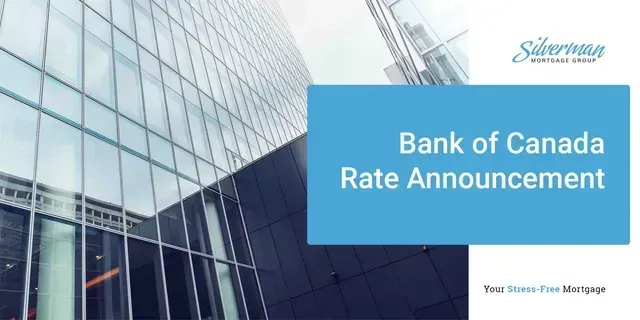Bank of Canada Rate Announcement Apr 13th, 2022
Zach Silverman | April 13, 2022
Bank of Canada increases policy interest rate by 50 basis points, begins quantitative tightening.
FOR IMMEDIATE RELEASE
April 13, 2022
The Bank of Canada today increased its target for the overnight rate to 1%, with the Bank Rate at 1¼% and the deposit rate at 1%. The Bank is also ending reinvestment and will begin quantitative tightening (QT), effective April 25. Maturing Government of Canada bonds on the Bank’s balance sheet will no longer be replaced and, as a result, the size of the balance sheet will decline over time.
Russia’s ongoing invasion of Ukraine is causing unimaginable human suffering and new economic uncertainty. Price spikes in oil, natural gas and other commodities are adding to inflation around the world. Supply disruptions resulting from the war are also exacerbating ongoing supply constraints and weighing on activity. These factors are the primary drivers of a substantial upward revision to the Bank’s outlook for inflation in Canada.
The war in Ukraine is disrupting the global recovery, just as most economies are emerging from the impact of the Omicron variant of COVID-19. European countries are more directly impacted by confidence effects and supply dislocations caused by the war. China’s economy is facing new COVID outbreaks and an ongoing correction in its property market. In the United States, domestic demand remains very strong and the US Federal Reserve has clearly indicated its resolve to use its monetary policy tools to control inflation. As policy stimulus is withdrawn, US growth is expected to moderate to a pace more in line with potential growth. Global financial conditions have tightened and volatility has increased. The Bank now forecasts global growth of about 3½% this year, 2½% in 2023 and 3¼% in 2024.
In Canada, growth is strong and the economy is moving into excess demand. Labour markets are tight, and wage growth is back to its pre-pandemic pace and rising. Businesses increasingly report they are having difficulty meeting demand, and are able to pass on higher input costs by increasing prices. While the COVID-19 virus continues to mutate and circulate, high rates of vaccination have reduced its health and economic impacts. Growth looks to have been stronger in the first quarter than projected in January and is likely to pick up in the second quarter. Consumer spending is strengthening with the lifting of pandemic containment measures. Exports and business investment will continue to recover, supported by strong foreign demand and high commodity prices. Housing market activity, which has been exceptionally high, is expected to moderate.
The Bank forecasts that Canada’s economy will grow by 4¼% this year before slowing to 3¼% in 2023 and 2¼% in 2024. Robust business investment, labour productivity growth and higher immigration will add to the economy’s productive capacity, while higher interest rates should moderate growth in domestic demand.
CPI inflation in Canada is 5.7%, above the Bank’s forecast in its January Monetary Policy Report (MPR). Inflation is being driven by rising energy and food prices and supply disruptions, in combination with strong global and domestic demand. Core measures of inflation have all moved higher as price pressures broaden. CPI inflation is now expected to average almost 6% in the first half of 2022 and remain well above the control range throughout this year. It is then expected to ease to about 2½% in the second half of 2023 and return to the 2% target in 2024. There is an increasing risk that expectations of elevated inflation could become entrenched. The Bank will use its monetary policy tools to return inflation to target and keep inflation expectations well-anchored.
With the economy moving into excess demand and inflation persisting well above target, the Governing Council judges that interest rates will need to rise further. The policy interest rate is the Bank’s primary monetary policy instrument, and quantitative tightening will complement increases in the policy rate. The timing and pace of further increases in the policy rate will be guided by the Bank’s ongoing assessment of the economy and its commitment to achieving the 2% inflation target.
Information note
The next scheduled date for announcing the overnight rate target is June 1, 2022. The Bank will publish its next full outlook for the economy and inflation, including risks to the projection, in the MPR on July 13, 2022.
A market notice providing operational details for QT will be published this morning on the Bank’s web site.







